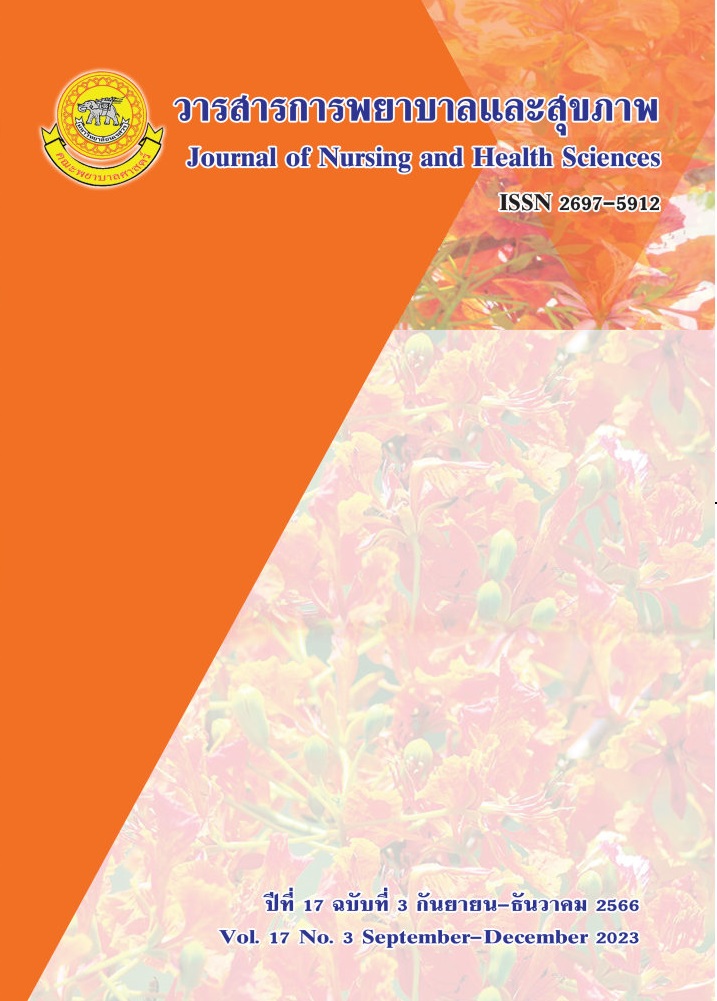Effects of a Self-Efficacy Enhancing Program on Exercise Behavior, Blood Pressure Level and Body Mass Index among a Pre-hypertension Group with Overweight, Sukhothai Province
Main Article Content
Abstract
The purpose of this quasi-experimental research aimed to examine the effects of a self-efficacy enhancing program on exercise behavior, blood pressure level and body mass index among a risk group of overweight participants. A cohort of 60 participants used a simple random sampling method was divided into two groups of 30 each, designated as the control group or the experimental group. The experimental group undertook a self-efficacy-enhancing program while the control group received regular nursing care. The self-efficacy program was based on Bandura's self-efficacytheory. The content validity index of the exercise behavior questionnaires was 0.95 with a reliability of 0.76 and the content validity index of the Self-efficacy questionnaires was 0.90 with a reliability of 0.74. The data were analyzed by descriptive statistics and a t-test. The outcomes of the programs were: 1) After program implementation, the average score for exercise behavior of the experimental group was statistically significantly higher than before program implementation while the blood pressure level and body mass index of the experimental group was statistically significantly lower than before program implementation (p < 0.05) 2) After program implementation, the average score of exercise behavior of the experimental group were statistically significant higher than the control group's average score of exercise behavior while the blood pressure level and body mass index of the experimental group were statistically significantly lower than that of the control group. (p <0.05) These results suggest that community nurse practitioners can valuably apply the self-efficacy enhancing program based on Bandura's self-efficacy theory to increase awareness of, and promote exercise behavior as a means to prevent hypertension.
Article Details

This work is licensed under a Creative Commons Attribution-NonCommercial-NoDerivatives 4.0 International License.
References
Association of Hypertension of Thailand. (2019).Guidelines for the Treatment of Hypertensionin General Practice 2019. Retrieved 29 August 2019 from http://www.thaihypertension.org/hypertensiondetail.php?n_id=442 [In Thai].
Bandura, A. (1977). Self-efficacy: toward a unifying theory of behavioral change. Psychological Review, 84(2), 191-215.
Cohen, J. (1977). Statistical power analysis for the behavioral sciences. New York:Academic Press.Evans, R. (1989). Albert Bandura: The man and his ideas-A dialogue. New York: Praeger.Kiatchanok, S. (2015). For a weight loss program for students who are overweight and obese. Journal of Suan Dusit University, 8(3), 97-118. [In Thai].
Noin, K. (2017). Overweight and obesity in school-age and Thai adolescents. Journal of Royal Thai Army Nurses, 18(suppl.2), 1-8. [In Thai].
Prasertthai, P., & Suwanno, J., & Sappawirawong,J. (2010). The effect of home-based moderateintensity exercise on lowering blood pressure in people with hypertension. Almost high blood pressure. Journal of the Nursing Council, 25(4),80-95. [In Thai].
Samacksaman, P., & Moolsart, S., & Chantawong, C.(2018). The effectiveness of a program for self-awareness and self-efficacy development in abdominal obesity housewives at Ta Kuk subdistrict, KhwaoSinrindistrict, Surin Province.Thai Journal of Nursing, 67(2), 27-35. [In Thai].
Sawetprasart, P. (2019). Effects of self-regulation program on weight loss behaviors and body weight among overweight female village health volunteers. The Journal of Prapokklao Hospital Clinical Medical Education Center, 36(1), 47-56.[In Thai].
Singtha, N. (2017). The effect of self-administration promotion program on disease prevention behaviors in these risk groups. Journal of Nursing and Health, 11(3), 81-91. [In Thai].
Sithiban, W., & Kaewsawat,S. (2019). Effects of perceived self-efficacy on preventionhy pertension in the pre-hypertension risk group Ron Phibun Sub-district, Ron Phibun District,Nakhon Si Thammarat Province. Public Health Journal, 28(special), 116-124. [In Thai].
Somphoch, I. (2019). Behavior modification theory and techniques. Bangkok: Chulalongkorn University Press. [In Thai].
Sukhothai Provincial Public Health Office.(2021).Health Data Center. Retrieved 30 January 2021 from https://sti.hdc.moph.go.th/hdc/main/index.php [In Thai].
Sukhothai Provincial Public Health Office.(2020).Health Data Center. Retrieved 30 January 2020 from https://sti.hdc.moph.go.th/hdc/main/index.php[In Thai].
World Health Organization. (2022). World Hypertension Day:WHO South-East Asia Region. Retrieved 25 November 2022 from https://www.who.int/southeastasia/news/speeches/detail/worldhypertension-day


